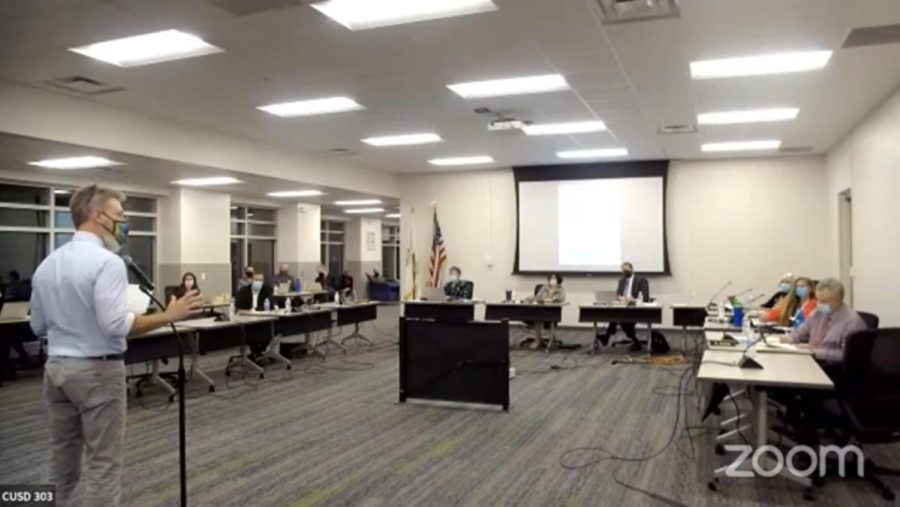On November 8, a number of educators throughout District 303 raised concerns at a meeting of the District’s Board of Education. Among these concerns were a lack of teacher resource and support given to teachers by the district.
According to the teachers who spoke at the meeting, the COVID-19 pandemic has exacerbated all of these issues, placing additional pressure on students and teachers. Overall, there was one phrase which summarized the teachers’ comments:
“We are burnt out.”
The teacher statements occurred during the public comments section of the Board meeting. More than 400 members of the St. Charles Education Association (SCEA) attended the meeting in support of the teachers who would be speaking on behalf of educators and students.
Speakers included the President of the SCEA, as well as teachers from the early childhood, elementary, middle, high school and special education levels.
Joe Blomquist, President of the SCEA, gave the introductory speech for the teachers. He began with what he said was the most important thing to remember: “We love the students of this district. We want nothing more than to see the students of this district succeed, help them find their passion and give them the support that they need to be happy and healthy.”
Blomquist continued by stating what educators have gone through over the past 20 months of the COVID-19 pandemic.
“From putting in place safety procedures in order to mitigate the spread of the virus, to trying new and imaginative ways to engage students virtually despite the countless obstacles of remote learning, we have used every ounce of our professional knowledge and skills to provide the best educational experience for our three-year-olds all the way up to our near-22-year-olds.”
In addition, Blomquist added other experiences of educators on the SCEA: “Many of our association members have tuned into board meetings in the last 20 months only to hear harsh and personal criticisms directed at them, and ill-informed directives dumped on them unexpectedly. And it has left some of our greatest assets feeling devalued, worn down, untrusted, and hurt.”
Next to speak was early childhood teacher Stephanie Tyson. Teaching at the Pre-K level, Tyson repeatedly stated that the early childhood department is not receiving adequate support from the district.
“In these challenging times, Early Childhood has come together to support each other, with minimal support from district administration,” Tyson said.
Tyson brought up specific changes that the early childhood department feels could improve the situation.
These included an ELL liaison, LRC director, additional instructional coaching, and a PTO at Fox Ridge, where the early childhood department is located.
Jenny Iwanski, who spoke next as the representative of the elementary school teachers in the SCEA, said that “D303’s current culture and climate is having a negative impact on our teachers and our students. We are exhausted by the additional efforts we are making to meet the needs of our students.”
Iwanski also noted that it is not just the teachers who are struggling, but the students as well.
“Our students are overwhelmed as well–their days are packed, with little to no flexibility. They seldom have mental down time… Many of our students are crying out for help through their behaviors,” Iwanski said.
Amanda Jacys, representing the special education department, spoke next.
“We believe there are disconnects challenging our effectiveness,” she said. “Disconnects between the administrators and the teachers, between expectations and resources, between plans and implementation, and between IEPs and students themselves.”
Jacys laid out specific steps that the Board, administration and district could take to alleviate some of the pressure placed on teachers.
“First, ensure that sufficient resources are in place to meet expectations and support students’ growth,” she said. This includes hiring additional support staff and collaborating with existing staff to identify student needs.
“Second, offer a systematic process for those professionals directly involved with the implementation of systems, programs, and resources to provide feedback,” she said. This would allow teachers to use their experience to reflect on what is working well and what is not working in a classroom setting.
“Third, implement regular opportunities for administrators to engage in order to better understand the unique needs of a variety of programs, environments and students,” Jacys added.
“Administrators need to actively see the impact of district-wide decisions and the reality of classrooms and students’ needs.”
Christine Vasilopoulos spoke for the teachers at the middle school level.
“Educators are overextended at a time when our children need us to be more available than ever before,” she said.
She also addressed the point that teachers are not receiving the growth opportunities which they deserve.
“Educators who take an interest in professional learning are far removed from the process, and instead see an endless cycle of false starts, frustration, anxiety, confusion, and resistance,” she said.
She asked that the district “treat them like the solution, not the problem.”
Dr. Bill Stepien, one of East’s lead teachers for the social studies department, spoke on behalf of high school faculty. Primarily, he highlighted the lack of communication between the administration and high school teachers, as well as the decision to implement final exams partway through the first semester.
“At the end of first quarter, we learned that we needed to give cross-river, common final exams. In the platform of Schoology, no less, a platform that most of us have little experience in because our students beg us not to use it,” he said. The additional time necessary to create, modify or check these final exams has taken away valuable planning and collaborative time from teachers, according to Stepien.
“We’ve been offered no rationale for these demands, and why they came midway through the semester. I still to this day have no idea who wanted this to happen, and for what purpose,” Stepien said.
He concluded by acknowledging that the board has introduced “innovative new ways of learning” with programs such as Compass Academy, but only when they work and collaborate with teachers.
Alice Froemling was Stepien’s counterpart from North adding to the high school perspectives. She brought up the impact that the current situation between teachers and the administration may be having on students’ mental health.
“One of the most precious plates we spin [as teachers] is the attention we keep on our students’ mental health. Already this year, I have had an alarming number of conversations with students who are stressed, exhausted and in tears from the demands put on them and the eagerness to get back to normal,” she said.
She also noted that “many of us are breaking, we’re dusting off our resumés.”
Froemling’s words are not just symbolic. One teacher who has made this decision to leave the district is Erika Kittl, an East Spanish teacher who agreed to be interviewed about her reasoning.
“The initiatives that have been implemented have taken away from the joy of teaching on the teachers’ end, and the joy of learning on the students’ end,” Kittl said. “There’s no possible way to avoid that impacting students.”
According to Kittl, “After the rally, we have not received any communication formally from the superintendent or from any district administrator.”
Kittl noted that the school-level administration at East has been working to support teachers.
“I think it’s important to know that at East, our administration is very supportive. Mr. Richter has sent out a lot of messages of support for teachers,” she said. “It’s not a building-level issue, but as things are falling, Principal Richter’s hands are also tied.”
“I wish parents and students knew how disheartening it is for teachers who have spent their whole career and passion, to not be given the credibility they deserve. It’s very demoralizing.
The X-Ray staff has reached out to the D303 central administration for comment, but has not received any comment at the time of publication.
Categories:
Teachers band together to share feelings of burn out
January 21, 2022
More to Discover
About the Contributors

Katie Kempff, Editor-in-Chief
Katie is a senior who has been on the X-Ray for all of her years at East, and now holds the position of co-Editor. Katie participates in a number of other extra-curricular activities, including the track, diving, and speech teams. She is passionate about journalism, and all kinds of competition; her favorite parts of being on X-Ray are the IHSA Journalism competitions, late production nights, and inside jokes with the rest of the staff. Katie’s claims to fame are a first place sectional award for copy editing her freshman year, and a sixth place award at state her junior year!

Allison Ollie, Staff Writer
Allison Ollie is a senior at East and a staff writer during her first year on the X-Ray team. She has an interest in politics, international news, and current events within the community. In addition to the X-Ray, Allison is the co-president of Model UN, an active volunteer, and a figure skater. She is most looking forward to the IHSA Journalism Competition and production “late nights.”








